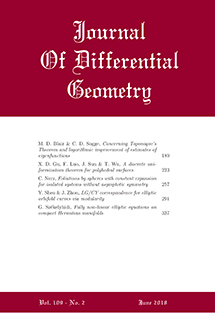Abstract
Let $f : U \to \mathbb{A}^1$ be a regular function on a smooth scheme $U$ over a field $\mathbb{K}$. Pantev, Toën, Vaquié and Vezzosi [30, 37] define the ‘derived critical locus’ $\mathbf{Crit}(f)$, an example of a new class of spaces in derived algebraic geometry, which they call ‘$-1$-shifted symplectic derived schemes’.
They show intersections of algebraic Lagrangians in a smooth symplectic $\mathbb{K}$-scheme, and stable moduli schemes of coherent sheaves on a Calabi–Yau $3$-fold over $\mathbb{K}$, are also $-1$-shifted symplectic derived schemes. Thus, their theory may have applications in algebraic symplectic geometry, and in Donaldson–Thomas theory of Calabi–Yau $3$-folds.
This paper defines and studies a new class of spaces we call ‘algebraic $d$-critical loci’, which should be regarded as classical truncations of the $-1$-shifted symplectic derived schemes of [30]. They are simpler than their derived analogues. We also give a complex analytic version of the theory, and an extension to Artin stacks.
In the sequels [4–8] we will apply $d$-critical loci to motivic and categorified Donaldson–Thomas theory, and to intersections of complex Lagrangians in complex symplectic manifolds. We will show that the important structures one wants to associate to a derived critical locus—virtual cycles, perverse sheaves, $\mathfrak{D}$-modules, and mixed Hodge modules of vanishing cycles, and motivic Milnor fibres—can be defined for oriented $d$-critical loci.
Citation
Dominic Joyce. "A classical model for derived critical loci." J. Differential Geom. 101 (2) 289 - 367, October 2015. https://doi.org/10.4310/jdg/1442364653
Information





